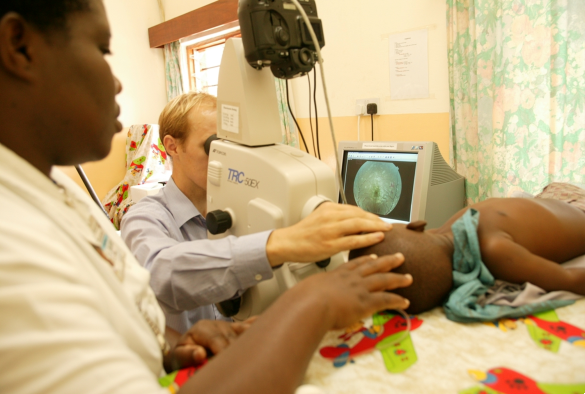£1.3m boost for malaria research

University of Liverpool researchers have been awarded a prestigious Wellcome Trust Joint Investigator Award to develop a method of identifying children at risk of dying from cerebral malaria in Africa.
Dr Nicholas Beare and Dr Yalin Zheng from the Department of Eye and Vision Science will combine expertise in clinical research with image analysis, artificial intelligence (AI), optical and electrical engineering to develop an eye scan which will detect brain swelling in these critically ill patients.
More than 400,000 people die of malaria every year, 90% are children in Africa with the severe form of cerebral malaria. The malaria parasite infects red blood cells which stick inside the blood vessels in the brain as well as the eye. Severe brain swelling sadly causes death in many, but at present an MRI brain scan is required to identify it.
Dr Beare, an ophthalmologist who has been researching cerebral malaria and its effects in the eye for over 20 years, has previously shown that the eye changes can improve diagnosis and predict outcome. The eye changes, known as malarial retinopathy, have provided many insights into cerebral malaria because it is possible to see small infected blood vessels at the back of the eye but not the brain.
Computer scientist Dr Zheng has developed techniques to automatically analyse images from the back of the eye in cerebral malaria as well as diabetic eye disease and glaucoma. In collaboration with the University of Liverpool’s Department of Electrical Engineering his team has developed a low-cost retina scanner (OCT scanner) which he will progress into a hand-held device for use in Africa.
The project is working with Malawi-Liverpool-Wellcome Clinical Research Programme in Queen Elizabeth Central Hospital in Blantyre, Malawi. The hospital has an MRI scanner for research, which most hospitals in Africa do not due to the prohibitive cost (£500,000). An OCT scanner can be built for £5,000 and can identify swelling of the optic nerve, which is connected to the brain. Dr Beare will also investigate whether retina scans can identify children at risk from long-term brain damage whose families will benefit from early support and guidance.
Dr Beare said: “Thanks to the Wellcome Trust we will be able to develop the OCT scanner for use across Africa, to identify children who need additional treatment for severe brain swelling. This award is testament to the fantastic work of the many researchers we work with from many different fields, to demonstrate the insights into malaria that we can get from looking into the eye”.
Dr Zheng said: “New technologies can transform healthcare. This award will offer us an opportunity to work with clinicians in the UK and Malawi to deliver our innovations in AI and imaging technologies to Africa where the healthcare resources are scarce, which in turn will benefit millions of African children suffering from malaria”.
The award will simultaneously fund researchers for three years in Malawi looking after children with cerebral malaria, and researchers in Liverpool developing a low-cost, robust, handheld OCT scanner; before the work is brought together in the fourth year of the programme.